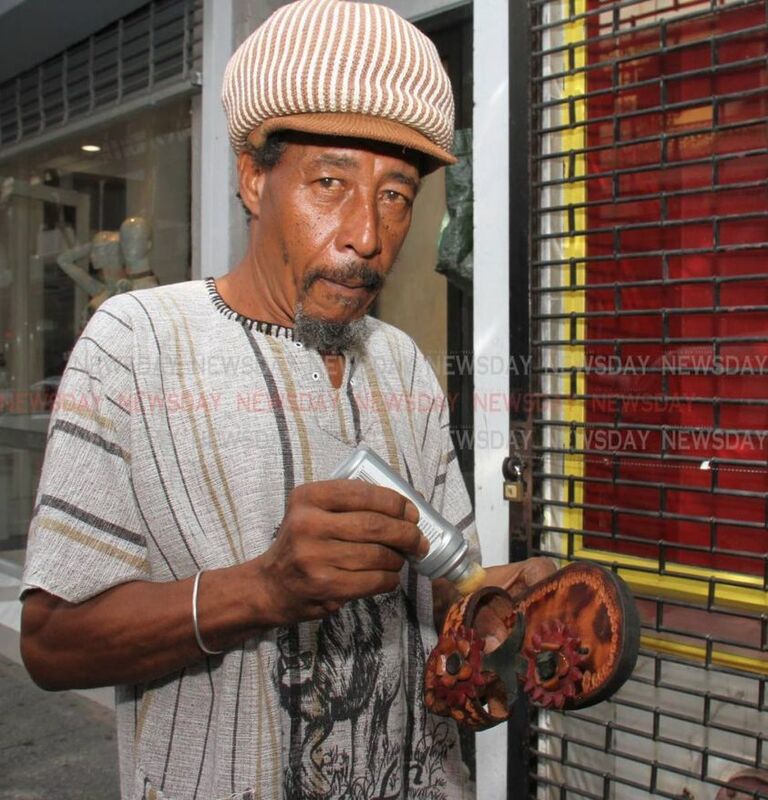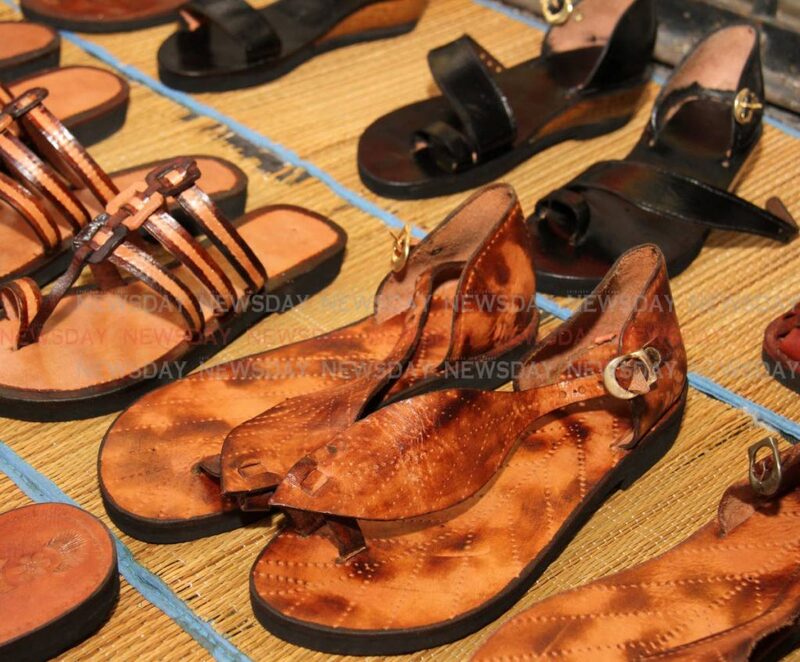|
The shoemaker - Trinidad and Tobago Newsday written by Valdeen Shears. March 2, 2024
Akanni Kamau was only 15 when he developed a love for craft. He made his first pair of slippers out of cardboard and hunted for scraps outside a shoe factory in St James when he decided to upgrade his product. He was so determined to hone his skills that he did a stint as a shoemaker just to learn the intricacies of how to "build" footwear. Soon the teen would go from cardboard slippers to his first pair of leather sandals, made from the scraps he had gathered. Kamau, now 63, told Business Day that his curious, teenage mind was at that time fixated on African culture and art. The self-taught craftsman said he read avidly on the topics and scored any publication he could get his hands on that offered teachings on craft. With no internet in those days to offer DIY tutorials, he persevered and did all his first creations by trial and error. "It started with just a thought that I could make sandals, beautifully crafted, artistic sandals and slippers. That I could one day see my creation on the feet of my countrymen and women. I lived at Nizam Street, St James at that time and the street behind there, Nepaul Street, had a shoe factory. I would go many days after school and gather scraps, just so I could use them to make more sandals and slippers. I experimented for two years, until I made one that I wore to market my work. It drew compliments and soon enough I was being asked to provide the same and similar designs for others," he recalled. This was all the encouragement he needed to recognise that he had found himself a viable business. The income was slow but sure, he said, so he worked as an air condition technician during the day and would excitedly get home to begin or complete a job for his quickly growing clientèle. Leather craftsman Akanni Kamau said while his creations are based on his own ideas, he is influenced by the wants and needs of his customers. Six years later, after building a customer base, Kamau said he knew he had to go all in and opened his first shop at Patna Street. He stayed there for over 15 years. "You have to truly love creating, satisfying your customers, for you to want to stay in this industry. I knew from the onset that any day job I did would soon take a back burner for my craft. It was no hard decision to leave my job then, my fixed income, my security blanket and branch out on my own doing my craft. I knew it would one day call for my full commitment and that day had reached." Kamau said while the current economy may somewhat negatively impact on the industry's sustainability, the market for craft is limitless and offers diverse opportunities. He firmly believes customers' needs and preference for durability keep the livelihoods of craftsmen and women going. "A satisfied customer is not one who has to return to buy every other month, but one who is loyal because the product bought is durable and lives up to his standards. People who love leather footwear see the sense in buying a sandal or slipper that will last longer than a month or two like most store bought shoes made out of plastic and compressed cardboard," reasoned the craftsman. Kamau is a father of two and a proud grandfather of seven. While none of his children followed in his footsteps, Kamau has passed on his legacy through others by training any youth who showed an interest. He recalled a group of young trainees who would "race each other to finish a project first." He would laugh at their antics, he said, and then sternly correct errors made in their haste to out do the other. Sadly, Kamau said, none of his trainees stuck it out. He said he suspects its because they could not see a clear way to secure a market and became discouraged. "Securing a market is often a deterrent for most creatives. They second guess their gifts, but if the ancestors give you, they will provide the means and opportunities for you to sustain yourself and your livelihood," he stressed. In the late 1980s, Kamau relocated to Clarence Street for five years and then again to De Norbriga Street, Morvant, where he is currently based. The move to Morvant meant he had to secure a new customer base. Some loyal customers followed him to Morvant, while some didn't. This though, did not faze the resilient craftsman, as he soon saw the support of his new community, several of whom wanted customised footwear. From time to time he takes a chance and markets his goods at lower Frederick Street, Port of Spain. Kamau's creations, while based on his own ideas, are very much influenced by what his customers want. So much so, that one customer took a photo of a pair of leather sandals in a popular shoe store in the city and sent it to him via social media. It was with a huge smile that she paid for her customised sandals two weeks later, he said. The artisan said he gets extreme satisfaction matching his creations to the personality of its wearer. Some of his work boasts brightly-coloured splashes, which he said women often gravitate towards. Kamau said he is sure that the versatility of any leather slippers or sandals will more than likely match any outfit in the average person's wardrobe. "My female customers can no doubt find a handbag, an earring, a chain, some fancy top they had been saving for a special occasion, to wear with one of the more decorative slippers or sandals. The lifted ones, with raised heels or wedge sandals are often a big hit for the ladies." It has not been all good times for his near 50-year journey, though. There have been struggles and he wishes that craftsmen and women would voice their need for a space of their own, particularly within the capital city. Some of the sandals made by leather craftsman Akanni Kamau. PHOTO BY ANGELO M MARCELLE
0 Comments
Leave a Reply. |
T&T news blogThe intent of this blog is to bring some news from home and other fun items. If you enjoy what you read, please leave us a comment.. Archives
May 2025
Categories
All
|




 RSS Feed
RSS Feed